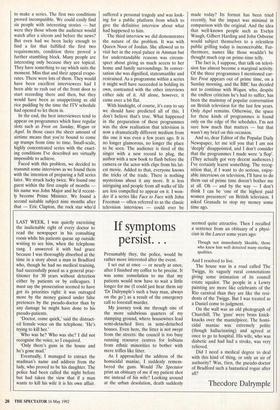If symptoms persist. . .
LAST WEEK, I was quietly exercising the inalienable right of every doctor to read the newspaper in his consulting room while his patients queue up outside waiting to see him, when the telephone rang. I answered it with bad grace because I was thoroughly absorbed at the time in a story about a man in Bradford who, though he had no medical training, had successfully posed as a general prac- titioner for 30 years without detection either by patients or by colleagues. I must say the prosecution seemed to have got its priorities right: it was outraged more by the money gained under false pretences by the pseudo-doctor than by any damage he might have done to his pseudo-patients.
'Doctor, come quick,' said the distract- ed female voice on the telephone. 'He's trying to kill her.'
Who was he? Who was she? I did not recognise the voice, so I enquired.
'Only there's guns in the house and he's gone mad.'
Eventually, I managed to extract the madman's name and address from the lady, who proved to be his daughter. The police had been called the night before but had taken the view that if a man wants to kill his wife it is his own affair. Presumably they, the police, would be rather more interested after the event.
I set out at once — or nearly at once, after I finished my coffee to be precise. It was some consolation to me that my patients would now have to wait a little longer for me (I could just hear them say 'Dr Dalrymple's such a busy man, always on the go') as a result of the emergency call to forestall murder.
My journey took me through one of the more salubrious quarters of my stamping ground, where housewives lead semi-detached lives in semi-detached houses. Even here, the litter is not swept from the streets: the council is too busy running resource centres for lesbians from ethnic minorities to bother with mere trifles like litter.
As I approached the address of the homicidal maniac, I suddenly remem- bered the guns. Would The Spectator print an obituary of me if my patient shot me instead of his wife? Looking around at the urban desolation, death suddenly seemed quite attractive. Then I recalled a sentence from an obituary of a physi- cian in the Lancet some years ago:
Though not immediately likeable, those who knew him well detected many sterling qualities.
And I resolved to live.
The house was in a road called The Twiggs, its vaguely rural connotations giving some intimation of its council estate squalor. The people in a Lowry painting are more like celebrants of the Rio carnival than they are like the resi- dents of the Twiggs. But I was treated as a Daniel come to judgment.
On the wall was an old photograph of Churchill. The 'guns' were brass knick- knacks over the mantelpiece. The homi- cidal maniac was extremely polite (though hallucinating) and agreed at once to go to hospital. His wife, who was diabetic and had had a stroke, was very relieved.
Did I need a medical degree to deal with this kind of thing, or only an air of authority? Was, then, the pseudo-doctor of Bradford such a faatastical rogue after all?
Theodore Dalrymple


















































 Previous page
Previous page